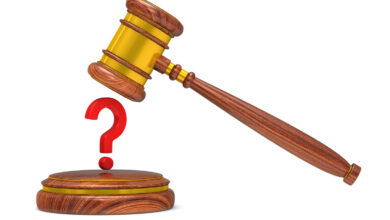Court of Appeals Eviscerates Trump’s Travel Ban, But This Fight is Only Beginning
The Trump legal team was pummeled yesterday by the 9th Circuit Court of Appeals. In a damaging, but not yet fatal blow, the Court denied the Trump administration’s attempt to reinstate the travel ban that had been temporarily blocked by a District Court Judge in Seattle.
This round went decisively to the plaintiffs, who are challenging Trump’s ban. The Court not only kept in place the District Court’s Temporary Restraining Order halting enforcement of the ban, but did so in breathtaking fashion.
All three Circuit Court judges joined in the unanimous decision, including a Republican appointee whose comments and questions during oral argument seemed to suggest he was leaning toward the Trump administration’s position.
The Circuit Court’s decision eviscerated key arguments made by Trump’s legal team. The court’s disdain for the government’s arguments was clearly visible between the lines of its carefully worded and meticulously reasoned opinion:
It brushed aside with “no difficulty” the government’s argument that the State of Washington had no standing to challenge the ban.
- It expressed open astonishment at the government’s claim that Trump’s Executive Order was not reviewable by the courts, a proposition for which it found “no precedent,” and branded as “contrary to the fundamental structure of our constitutional democracy.”
- It found that Trump’s legal team had not shown that they were likely to succeed in their opposition to the plaintiffs’ Constitutional Due Process claim, and noted the “serious nature” of plaintiffs’ claims of religious discrimination.
- It ridiculed the government’s claim that the courts should rely on interpretations of the White House Counsel that seemed at odds with the text of the Executive Order itself, with the curt observation that “the White House counsel is not the President, and he is not known to be in the chain of command for any of the Executive Departments.”
- It took a gratuitous poke at the Trump administration’s “shifting interpretations,” pointing out that even if the White House counsel’s interpretations were authoritative and binding, the court couldn’t be confident that Trump’s ever-changing positions would “persist past the immediate stage of these proceedings.”
- It rejected the government’s backup position that, if the TRO were to be kept in place at all, it should be strictly limited to certain narrow classes of people.
- It declined to limit the nationwide geographic scope of the TRO.
This was, in a word, a rout.
Still, while a major setback for the Trump administration, it would be a mistake to view the Court’s decision today as a clear harbinger of how the case will ultimately be decided. This ruling, like the District Court’s granting of the TRO, was based on a very preliminary evidentiary record, and was technically limited to the narrow question of whether the court would allow the travel ban to remain in place in the days or weeks before the court makes its final decision.
The big show is yet to come. Once the preliminary skirmishes are over, probably in a matter of weeks, the case will be heard on the merits. The initial decision likely will be made by the same District Court judge that granted the TRO.
That decision, in turn, almost certainly will go back to the Circuit Court on an appeal by the losing side. Maybe both sides will appeal if the trial court’s decision grants some but not all the relief the plaintiffs are seeking.
After that appeal is decided, the losing party will probably seek review by the United States Supreme Court. Although the Supremes reject most requests for review of Circuit Court decisions, the importance of this case, and the possibility of conflicting decisions from other courts, makes it more likely than usual that they will review this one. But it is also possible that they will take a pass. The justices could decide that there is no compelling reason to review the decision of the Circuit Court. Or they might just want to avoid jumping into a briar patch bristling with thorny political issues.
Whether this ends up in the Supreme Court or not, the fallout from this case could persist long after the last court makes the last decision in this lawsuit.
The irony here is that the ruling on the discrete issue to be decided in the case, whether Trump’s travel ban will stand, could turn out to be the least of what’s at stake. It is doubtful that the ban, if allowed, would have any significant impact on our national security. Countless other potential sources of terrorism – home grown extremists, legal and illegal entrants from other countries across the globe, guests who have overstayed their visas, and many more – probably pose greater security risks than people from the seven banned countries. And don’t forget that the ban expires in 90 days anyway.
The more important battle could just be starting when the lawsuit ends. If any portion of the final court decision goes against him, the next act in the drama could depend on whether Trump will accept and abide by the court’s ruling. If he refuses to do so, he could trigger the mother of all constitutional crises. An all-out battle between the Executive and the Judiciary might even have to be settled by the Legislature in impeachment proceedings.
Of course, none of this needs to happen. There’s more than one way out of this mess. Trump could go back to the drawing board and come up with a more thoughtfully crafted Executive Order. Or he could just run out the clock, roll out the “extreme vetting” program that is supposed to replace the ban anyway, and thus take the ban, and all the issues around it, completely off the table.
But if Trump persists in his stubborn insistence on waging an all-out war over a carelessly drafted Executive Order that was always more for show than substance, he risks setting in motion a series of events that could rapidly tumble out of his control.
The 9th Circuit’s ruling yesterday offers only a hint at the thicket of legal, civic and political issues we are likely to face if Trump fights this war to the bitter end. Those issues go to fundamental constitutional questions regarding separation of powers, due process, religious freedom, and more. How those issues shake out could have big consequences.
So fasten your seatbelts. We could be in for a bumpy ride if Trump keeps fighting this unnecessary battle.





